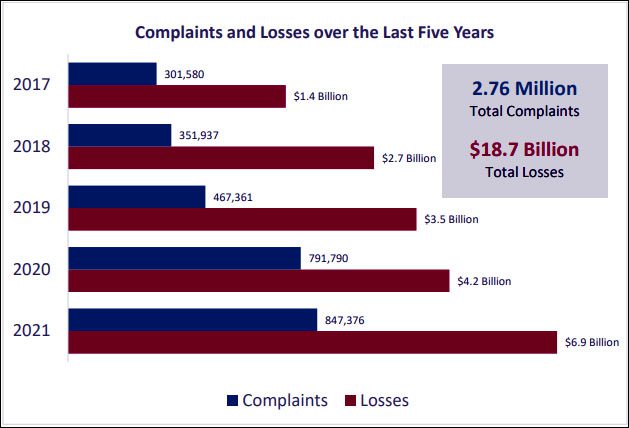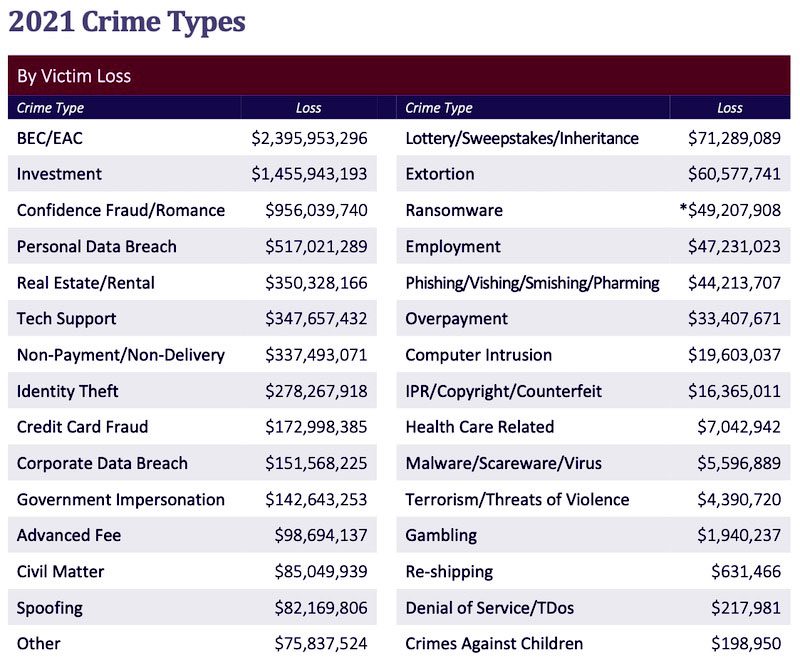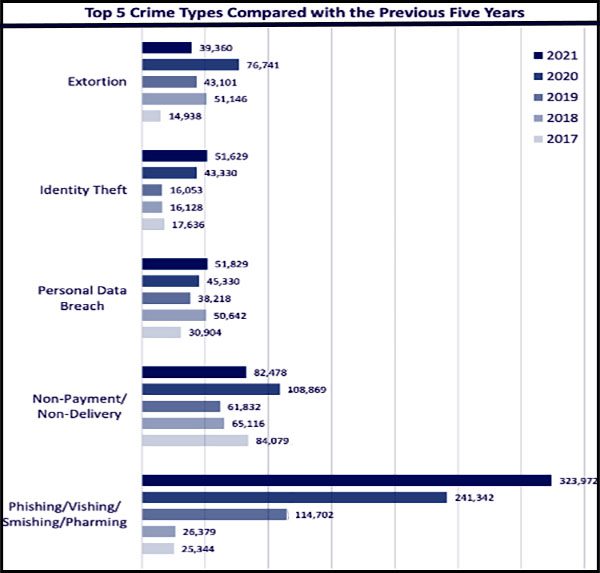Cybercrime Losses Increase at Alarming Rate

IC3 Report Reveals Massive Upticks in BEC & Crypto Fraud.
The United States Federal Bureau of Investigation (FBI) actively investigates cybercrime complaints around the U.S. that are brought to its attention by both businesses and individuals through its Internet Crime Complaint Center (IC3).
Every year an illuminating report is released of that activity showing how cybercrime is trending in the U.S. While the report only counts cybercrime that was reported to law enforcement, it’s still a great way to get a snapshot of how cyberattacks and cybercrime play out in any given year – and it’s easy to see that 2021 was a good year for the bad guys.
Cybercrime Losses Hit a New Record in 2021
The recently released IC3 2021 Internet Crime Report breaks down the cybercrime, the Bureau recorded in 2021 to shed a little light on the growth or change in cybercrime in general in the U.S. And what a year it was, easily destroying 2020’s totals.
IC3 received a record number of complaints in 2021. The total of 847,376 reported complaints, wasn’t so much larger than the year prior, just a 7% increase from 2020.
But the money total is a stunner. The total amount of loss reported hit a new record high in 2021 of $6.9 billion. That’s a whopping 48% increase over 2020.

BEC is Still at the top of the list
The complaints that IC3 fielded were varied. Everything that you’d expect to see is on the list with ransomware, business email compromise (BEC) and cryptocurrency fraud were the top incidents reported.
The BEC/EAC category clocked in at a painful $2,395,953,296 in losses for 2021, 28% higher than 2020’s record total, with 3% more total BEC complaints.
In a breakdown, analysts said that while they did receive plenty of complaints that referenced traditional BEC scams, there has been some evolution in the field, making today’s highly sophisticated BEC scams harder for the targets to detect.
It’s become commonplace for cybercriminals to perpetrate BEC by breaking into executive email accounts and spoof business leaders’ communications or steal their identities in order to initiate fraudulent wire transfers. In those cases, the fraudulent wire transfers were typically transferred to cryptocurrency wallets and dispersed, making recovery efforts more difficult.
The report also detailed another pandemic-era BEC variant that also makes use of virtual meeting platforms and some smart social engineering to defraud victims in an unfortunately highly believable scenario.

Ransomware, Government Impersonation & Tech Support Fraud Escalated
Rounding out the top 5 categories of complaints IC3 received in 2021, romance scams, usually number two, dropped to number three even though the category had a 59% increase from 2020.
Personal data breach was in the fourth position although the category showed some serious growth, with a 2021 loss total of $517,021,289, a 165% jump from 2020’s total losses.
In fifth, real estate and rental scams came in at 64% change from 2020. Other notable changes include a major jump in the losses associated with tech support scams, which cost victims a 137% rise over total losses compared to 2020.
And government impersonation scams, which grew by a nice round 30%, with losses totaling $142,643,253 in 2021.
But ransomware wasn’t forgotten, even if it didn’t crack the top 10 for total losses or total complaints. In fact, it barely made the top 20. In 2021, IC3 received 3,729 complaints identified as ransomware with adjusted losses of more than $49.2 million. Ransomware still posted some unfortunately impressive numbers.
The report also offers a look at how five of its highest-ranking cybercrimes have trended for the past five years in a handy chart that makes it easy to follow the flow. The chart includes yearly and aggregate data for total complaints and total losses over the years 2017 to 2021.

